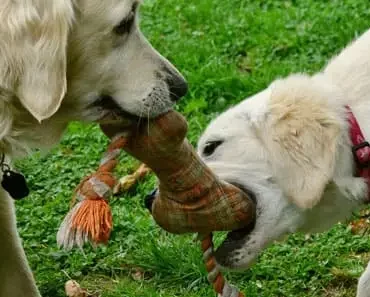
When it comes to finding the best Golden Retriever collar, there are many factors to consider. Your dog’s size, temperament, and activity level all play a role in determining which collar is best suited for them. Choosing the wrong collar can result in discomfort, injury, or even escape. In this article, we will explore the different types of collars available for Golden Retrievers, which collar should you pick? and help you make an informed decision.
Table of Contents
Why Do I Need A Golden Retriever Collar?
If you’re a new dog owner, you may be wondering why your furry friend needs a collar. It may seem like a small detail, but it’s actually an essential part of your dog’s safety and well-being. Here’s why.
First and foremost, a collar with an ID tag is crucial in case your dog gets lost. Even if your dog is microchipped, a visible ID tag with your name and contact details makes it easier for someone to reach out to you and reunite you with your beloved pet. Plus, in some states, it’s a legal requirement for dogs to wear identification tags.
Another reason why dogs need collars is for walks. A leash can be attached to the collar, making it easier for you to control your dog and keep them safe while out and about. While some dog owners prefer harnesses or halters, a collar is still a common and effective option for walking your dog.
Additionally, if you need to license your pet in your area, you’ll need to attach their license to their collar. This helps ensure that your dog is up to date with their vaccinations and meets any other requirements in your location.
The Different Types of Golden Retrievers Collars
Flat collars
Flat collars are a popular and standard type of collar for dogs. They are made of materials such as nylon, rubber, or leather and rest flat against the dog’s neck. Typically, a D-ring or metal loop is sewn into the collar, allowing for ID tags and a leash to be easily attached. Flat collars are an excellent option for dogs who are well-trained and do not pull while walking. However, if a dog does pull on the leash while wearing a flat collar, it can strain the dog’s neck and may slip off.
For Goldens that are active and always on the go, a padded flat collar is an excellent option. This type of collar provides sturdy support, which is ideal for dogs that are constantly running around and playing. While some flat collars may get caught in a Golden Retriever’s long and beautiful coat, there are others that are specifically designed to stay in place naturally, without causing any discomfort to your furry friend. Additionally, keeping a flat collar on your Golden Retriever at all times is not a bad idea, as it can help ensure that your dog is easily identifiable in case they get lost.
Rolled Collars
If you have a Golden Retriever with a long coat, a rolled collar may seem like a great option. These collars are typically made of rolled narrow leather and are quite popular. However, it’s important to note that when using a leash, the rolled collar can be even more of a choking hazard than a flat collar. While rolled collars can be a great choice for Goldies, it’s essential to switch to a harness or a different collar when using a leash to avoid any potential dangers.
Martingale Collar
The martingale collar, also called a limited-slip collar, is a collar that combines the functionality of a slip collar with a regular collar. It is an excellent option for dog owners who want more control over their dogs without the risk of choking them. The martingale collar is perfect for breeds like Greyhounds or Whippets that have narrow heads, which make them more prone to slipping out of a flat collar.
The collar is designed to slip over the dog’s head and rest high on the neck, just below the jawline. When the dog pulls on the leash, the collar tightens, and when they relax, it loosens again. Although a martingale collar is not a complete substitute for a flat collar, it’s a great option for dogs that need extra control. It’s essential to supervise a dog wearing a martingale collar to ensure that it does not get caught on anything.
Dog Harnesses
Harnesses are a popular alternative to collars for dogs who tend to pull on their leash or who have sensitive neck. They distribute the pressure of the leash across your dog’s chest and back, rather than just their neck. There are several types of harnesses available, including front-clip harnesses and back-clip harnesses. Front-clip harnesses are a good choice for dogs who pull, while back-clip harnesses are better suited for well-behaved dogs.
Prong Collars
Prong collars rest on a dog’s neck and are designed with metal or plastic “prongs.” They rely on pressure and pain to control the dog when it pulls on its leash. Some prong collars, like the Starmark collar, use the same aversive techniques but look less intimidating. However, many animal welfare groups discourage their use due to the potential for severe damage to a dog’s neck and trachea if the collar is misused.
Shock Collars
Shock Collars, also known as Dog training collars or electronic collars, are devices that work by giving a warning beep or vibration followed by a remote shock if your dog doesn’t stop bad behavior. These collars are commonly used with electronic fencing, which delivers a shock at the collar’s contact points when your dog crosses the fence boundaries. The shock level varies from a tickling sensation to a more painful shock.
The beep warns your dog to stop the bad behavior and associate it with the subsequent shock, which can ultimately modify their behavior. Although the idea of shocking dogs can be upsetting to some owners, these collars can be an effective tool for behavior modification when used correctly.
Factors to Consider When Choosing a Golden Retriever Collar

Size
When selecting a collar for your Golden Retriever, it’s important to keep their long, thick coat in mind. A collar that is too tight can rub against their fur and cause it to break. While some people prefer rolled collars, others have no issues with flat collars.
To ensure your dog can play freely, choose a lightweight and padded collar that is around 1.5 inches wide. The collar should also be long enough so that no more than two fingers can fit snugly between the collar and your dog’s neck. Keep in mind that Golden Retrievers have an average neck size of 16 to 24 inches and need a wide collar for added support and strength.
Read More : Golden Retriever Weight And Growth Chart All You Need To Know
Activity Level
Golden Retrievers are known for their high energy and liveliness, so it’s important to choose a dog collar that won’t restrict their movements or cause discomfort while playing. A lightweight collar is ideal as it won’t weigh them down or hinder their agility.
Collars that come with a mouth collar may not be suitable for a Golden Retriever as they can be too loose and easily slip off, which could be dangerous if your dog is running or playing in an open area. Therefore, it’s essential to select a collar that is both comfortable and secure, providing enough freedom for your Golden to move around and play while keeping them safe.
Material
The material of the collar is also important to consider. Leather collars are durable and can last for years, while nylon collars are affordable and easy to clean. However, if your Golden Retriever has sensitive skin, you may want to consider a collar made from a softer material, such as neoprene.
Final Thoughts
In order to prevent potential harm to your Golden Retriever, it is not recommended to use collars with large prongs or choke chain collars. These types of collars can cause damage to your dog’s windpipe, which can be dangerous and painful.
Golden Retrievers are naturally very obedient and easy to train because of their desire to please their owners, so these harsh collars are unnecessary. It is important to prioritize your dog’s safety and well-being by selecting a collar that is both comfortable and effective in training.






